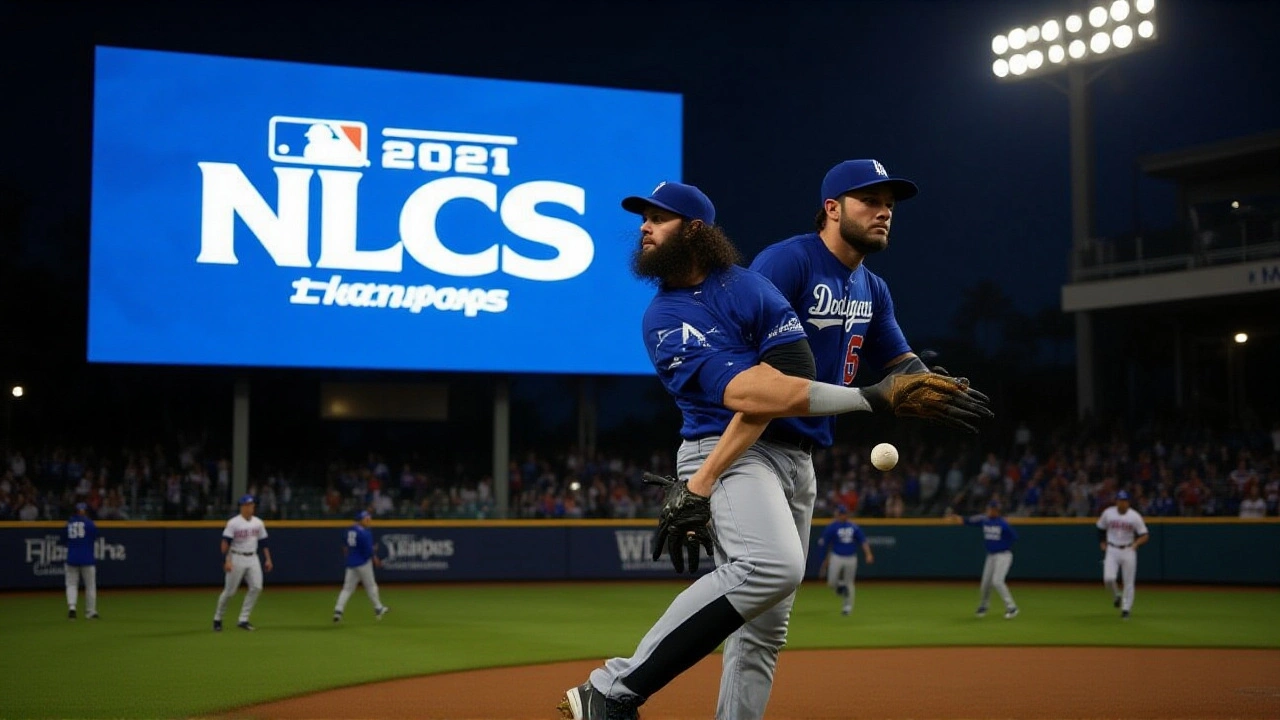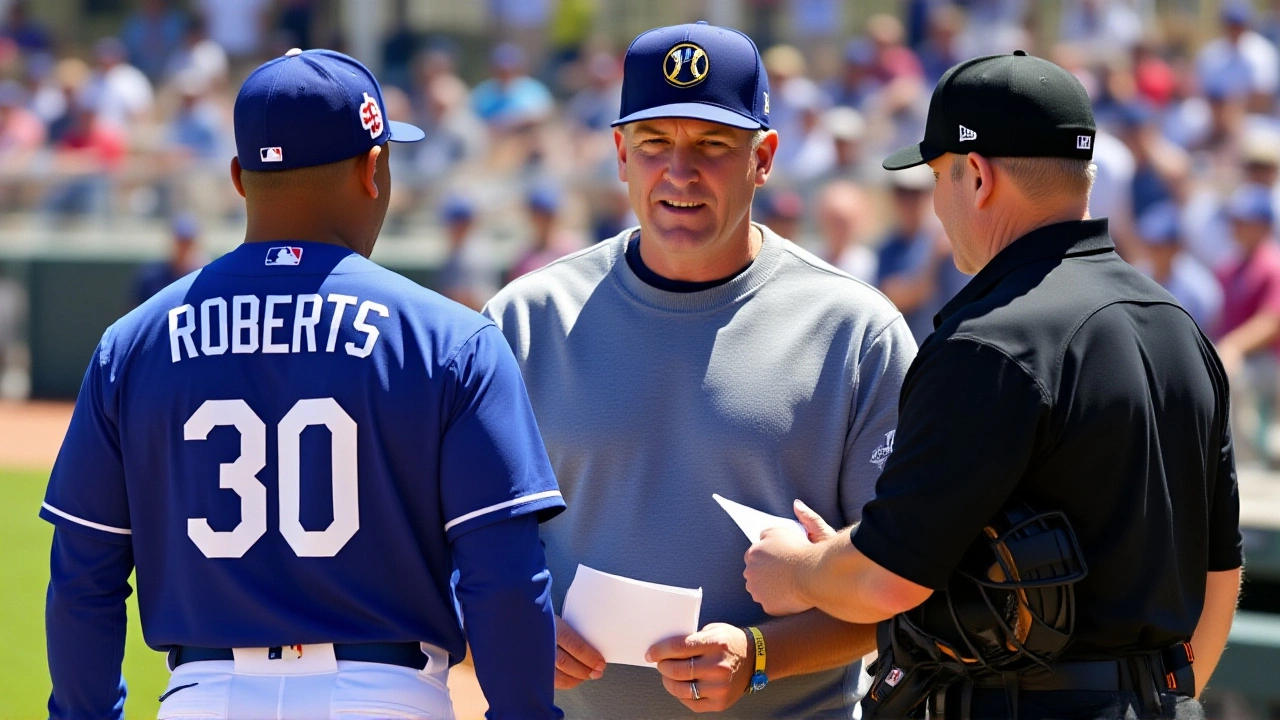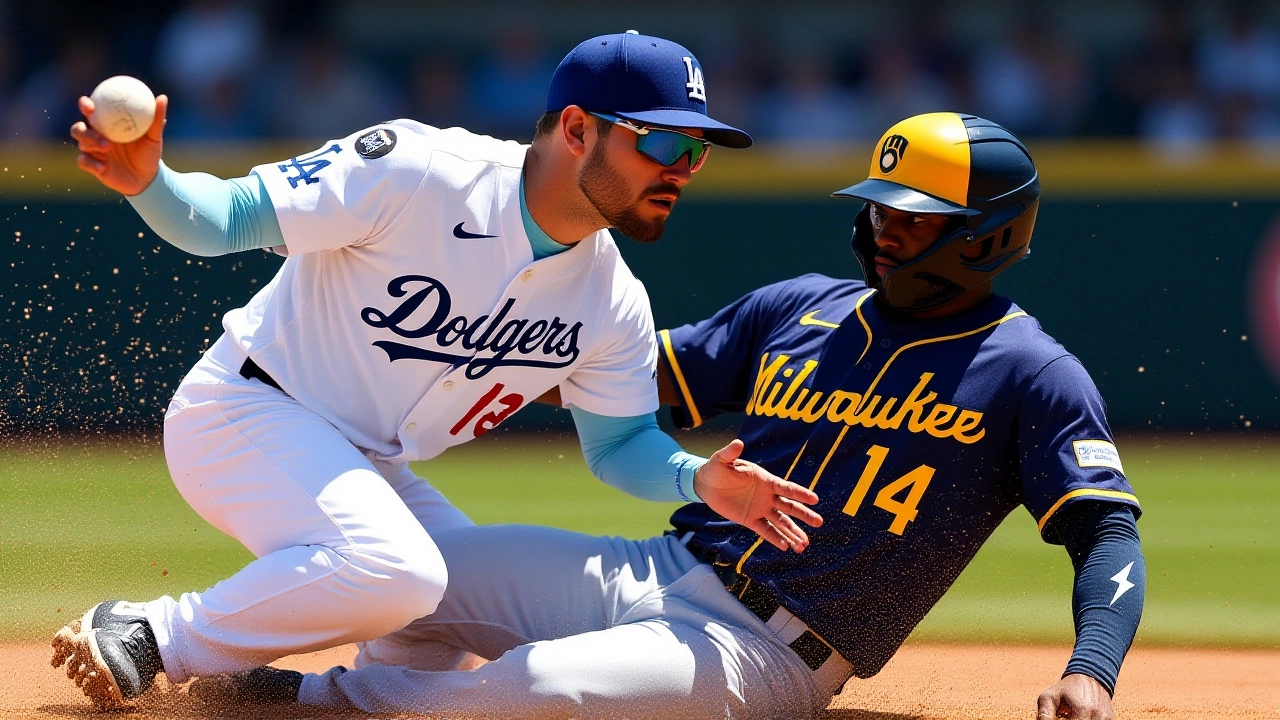When Freddie Freeman, the 35‑year‑old first baseman for the Los Angeles Dodgers, launched a towering solo homer in the sixth inning, the Dodgers secured a 2–1 win over the Milwaukee Brewers in Game 1 of the National League Championship Series. The drama unfolded on Monday, October 13, 2025, at 7:05 PM Central Time inside American Family Field in Milwaukee, Wisconsin. It wasn’t just a win; it was a statement that the Dodgers still have the firepower to silence a hostile crowd.
Game‑changing moments
The sixth‑inning blast came after a rattling sequence of events that left even seasoned fans clutching their throats. Earlier, in the fourth inning, Dodgers slugger Max Muncy smashed a would‑be grand‑slam 404 feet to dead‑center. Brewers center fielder Sal Frelick leapt, bobbled, then recovered the ball, tossing it to shortstop Joey Ortiz who fired it home. The ensuing chaos produced baseball’s first 8‑6‑2U double play in postseason history – a three‑minute replay review in New York confirmed the oddball notation.
Meanwhile, the Brewers tried to answer back. In the bottom of the ninth, Jackson Chourio lifted a fly to center that let Isaac Collins sprint home, narrowing the gap to 2‑1. The decisive strike, however, came when Dodgers manager Dave Roberts called on 37‑year‑old right‑hander Blake Trinan to close the game. Trinan fanned the final batter with the bases loaded, sealing the victory and sending the crowd into a stunned silence.
Pitching duel and bullpen drama
Behind the offensive fireworks, the pitching matchup was a study in endurance. Dodgers’ ace Blake Snell, 32, delivered a masterclass through six innings, retiring 13 straight Brewers batters at one point and, oddly enough, not throwing a single fastball in the seventh as the mercury hovered at a sweltering 96 °F. Snell also surprised everyone with a pickoff of Caleb Durbin, showcasing a poise usually reserved for veteran left‑handers.
Milwaukee’s starter, Aaron Ashby, 26, struck out Freeman in the first inning but soon found himself chasing shadows as the Dodgers’ offense kept the pressure on. The bullpen drama peaked in the ninth when the Dodgers’ relievers faltered briefly, prompting a quick call‑up of Trinan. On the Brewers side, reliever Blake Trinan (yes, the same name, but a different player) held firm, delivering the final strike that preserved the lead.

Managerial reactions and historical context
Brewers manager Pat Murphy, who has been at the helm since November 2, 2023, could barely conceal his frustration. “Freddie Freeman has been a Brewer killer for a while,” Murphy said in the post‑game interview, adding, “So hopefully he’ll oversleep tomorrow or something.” It’s a sigh that echoes a broader narrative: this was the third postseason meeting between the clubs since Milwaukee joined the National League in 1998, and the Dodgers have won the previous two (2018 NLCS and 2021 NLDS).
Commissioner Rob Manfred oversaw the game, reminding everyone that a Game 1 win historically translates into a 77.5 % series‑victory probability, according to MLB’s 2024 postseason analytics report. The Dodgers, looking to extend their recent stretch of deep playoff runs, now sit in a comfortable 1‑0 lead.
What the win means for the series
Statistically, taking the first game puts a team in a position that only 14.3 % of teams have managed to overturn since 2014 when they fall into a 0‑2 hole. The Brewers, therefore, face a steep hill. Their defensive strengths were evident – they “take away the ball on the ground and at the wall,” a Sports Illustrated analyst noted – but Freeman’s homer found the one zone they couldn’t defend: the upper‑deck stands.
Looking ahead, Game 2 is set for Tuesday, October 14, 2025, at the same venue, 7:05 PM Central. If Milwaukee can tighten the gaps and capitalize on the Dodgers’ bullpen glitches, the series could swing back. Otherwise, Los Angeles will look to build a commanding 2‑0 lead.

Key takeaways
- Freddie Freeman’s solo home run (estimated 425 feet) provided the decisive margin.
- Blake Snell retired 13 straight batters, showcasing dominance despite the heat.
- The first 8‑6‑2U double play in postseason history highlighted the game’s defensive intrigue.
- Pat Murphy’s candid post‑game remarks underscored the emotional weight of the loss.
- Statistically, a Game 1 win gives the Dodgers a 77.5 % chance to clinch the series.
Frequently Asked Questions
How does Freeman’s home run affect the Brewers’ chances?
Freeman’s sixth‑inning blast turned a 1‑1 tie into a 2‑1 lead, forcing Milwaukee into a chase mode. Historically, teams that surrender a lead in the sixth inning or later in NLCS games win only about 30 % of the time, so the Brewers now need a big offensive burst to stay alive.
What made the 8‑6‑2U double play historic?
It was the first time a double play involving a catcher (8), pitcher (6), shortstop (2) and an unusual “U” (unassisted) configuration appeared in postseason records. The play emerged from a chaotic base‑running mishap after Muncy’s near‑grand‑slam, highlighting how split‑second decisions can rewrite the rule book.
Will the Dodgers’ bullpen be reliable in Game 2?
While the ninth‑inning wobble raised eyebrows, reliever Blake Trinan’s composure under pressure suggests the depth is intact. However, the Brewers’ offense is hot, so the Dodgers will likely lean on veterans like Blake Snell for longer outings.
What does the series win probability look like after Game 1?
MLB’s 2024 analytics indicate a 77.5 % chance for the team that wins Game 1 to take the series. If the Dodgers keep their momentum, the odds climb even higher, especially given their historical 2‑0 lead success rate of 90 %.
How does this win fit into the Dodgers’ postseason legacy?
It adds another chapter to a recent run that includes three straight World Series appearances (2021‑2023). Securing the first NLCS win reinforces Los Angeles’ reputation as a franchise that thrives in high‑pressure moments.
